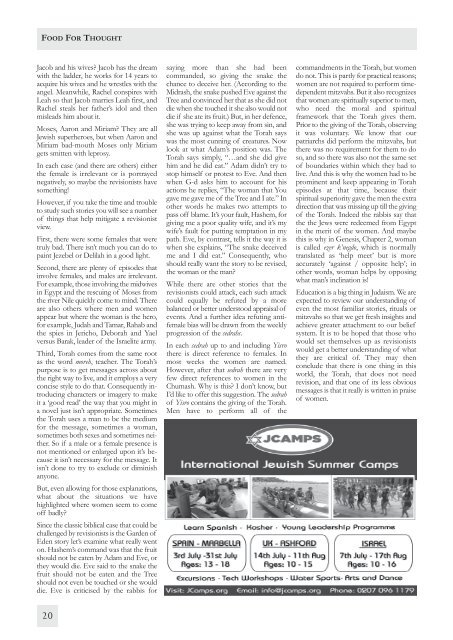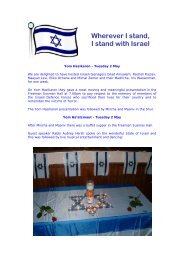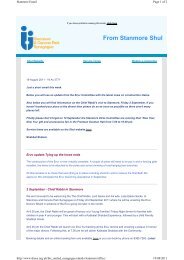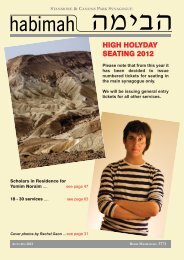STANMORE & CANONS PARK SYNAGOGUE - Stanmore and ...
STANMORE & CANONS PARK SYNAGOGUE - Stanmore and ...
STANMORE & CANONS PARK SYNAGOGUE - Stanmore and ...
You also want an ePaper? Increase the reach of your titles
YUMPU automatically turns print PDFs into web optimized ePapers that Google loves.
FOOD FOR THOUGHT<br />
Jacob <strong>and</strong> his wives Jacob has the dream<br />
with the ladder, he works for 14 years to<br />
acquire his wives <strong>and</strong> he wrestles with the<br />
angel. Meanwhile, Rachel conspires with<br />
Leah so that Jacob marries Leah first, <strong>and</strong><br />
Rachel steals her father’s idol <strong>and</strong> then<br />
misleads him about it.<br />
Moses, Aaron <strong>and</strong> Miriam They are all<br />
Jewish superheroes, but when Aaron <strong>and</strong><br />
Miriam bad-mouth Moses only Miriam<br />
gets smitten with leprosy.<br />
In each case (<strong>and</strong> there are others) either<br />
the female is irrelevant or is portrayed<br />
negatively, so maybe the revisionists have<br />
something!<br />
However, if you take the time <strong>and</strong> trouble<br />
to study such stories you will see a number<br />
of things that help mitigate a revisionist<br />
view.<br />
First, there were some females that were<br />
truly bad. There isn’t much you can do to<br />
paint Jezebel or Delilah in a good light.<br />
Second, there are plenty of episodes that<br />
involve females, <strong>and</strong> males are irrelevant.<br />
For example, those involving the midwives<br />
in Egypt <strong>and</strong> the rescuing of Moses from<br />
the river Nile quickly come to mind. There<br />
are also others where men <strong>and</strong> women<br />
appear but where the woman is the hero,<br />
for example, Judah <strong>and</strong> Tamar, Rahab <strong>and</strong><br />
the spies in Jericho, Deborah <strong>and</strong> Yael<br />
versus Barak, leader of the Israelite army.<br />
Third, Torah comes from the same root<br />
as the word moreh, teacher. The Torah’s<br />
purpose is to get messages across about<br />
the right way to live, <strong>and</strong> it employs a very<br />
concise style to do that. Consequently introducing<br />
characters or imagery to make<br />
it a ‘good read’ the way that you might in<br />
a novel just isn’t appropriate. Sometimes<br />
the Torah uses a man to be the medium<br />
for the message, sometimes a woman,<br />
sometimes both sexes <strong>and</strong> sometimes neither.<br />
So if a male or a female presence is<br />
not mentioned or enlarged upon it’s because<br />
it isn’t necessary for the message. It<br />
isn’t done to try to exclude or diminish<br />
anyone.<br />
But, even allowing for those explanations,<br />
what about the situations we have<br />
highlighted where women seem to come<br />
off badly<br />
Since the classic biblical case that could be<br />
challenged by revisionists is the Garden of<br />
Eden story let’s examine what really went<br />
on. Hashem’s comm<strong>and</strong> was that the fruit<br />
should not be eaten by Adam <strong>and</strong> Eve, or<br />
they would die. Eve said to the snake the<br />
fruit should not be eaten <strong>and</strong> the Tree<br />
should not even be touched or she would<br />
die. Eve is criticised by the rabbis for<br />
saying more than she had been<br />
comm<strong>and</strong>ed, so giving the snake the<br />
chance to deceive her. (According to the<br />
Midrash, the snake pushed Eve against the<br />
Tree <strong>and</strong> convinced her that as she did not<br />
die when she touched it she also would not<br />
die if she ate its fruit.) But, in her defence,<br />
she was trying to keep away from sin, <strong>and</strong><br />
she was up against what the Torah says<br />
was the most cunning of creatures. Now<br />
look at what Adam’s position was. The<br />
Torah says simply, “…<strong>and</strong> she did give<br />
him <strong>and</strong> he did eat.” Adam didn’t try to<br />
stop himself or protest to Eve. And then<br />
when G-d asks him to account for his<br />
actions he replies, “The woman that You<br />
gave me gave me of the Tree <strong>and</strong> I ate.” In<br />
other words he makes two attempts to<br />
pass off blame. It’s your fault, Hashem, for<br />
giving me a poor quality wife, <strong>and</strong> it’s my<br />
wife’s fault for putting temptation in my<br />
path. Eve, by contrast, tells it the way it is<br />
when she explains, “The snake deceived<br />
me <strong>and</strong> I did eat.” Consequently, who<br />
should really want the story to be revised,<br />
the woman or the man<br />
While there are other stories that the<br />
revisionists could attack, each such attack<br />
could equally be refuted by a more<br />
balanced or better understood appraisal of<br />
events. And a further idea refuting antifemale<br />
bias will be drawn from the weekly<br />
progression of the sedrahs.<br />
In each sedrah up to <strong>and</strong> including Yisro<br />
there is direct reference to females. In<br />
most weeks the women are named.<br />
However, after that sedrah there are very<br />
few direct references to women in the<br />
Chumash. Why is this I don’t know, but<br />
I’d like to offer this suggestion. The sedrah<br />
of Yisro contains the giving of the Torah.<br />
Men have to perform all of the<br />
comm<strong>and</strong>ments in the Torah, but women<br />
do not. This is partly for practical reasons;<br />
women are not required to perform timedependent<br />
mitzvahs. But it also recognizes<br />
that women are spiritually superior to men,<br />
who need the moral <strong>and</strong> spiritual<br />
framework that the Torah gives them.<br />
Prior to the giving of the Torah, observing<br />
it was voluntary. We know that our<br />
patriarchs did perform the mitzvahs, but<br />
there was no requirement for them to do<br />
so, <strong>and</strong> so there was also not the same set<br />
of boundaries within which they had to<br />
live. And this is why the women had to be<br />
prominent <strong>and</strong> keep appearing in Torah<br />
episodes at that time, because their<br />
spiritual superiority gave the men the extra<br />
direction that was missing up till the giving<br />
of the Torah. Indeed the rabbis say that<br />
the the Jews were redeemed from Egypt<br />
in the merit of the women. And maybe<br />
this is why in Genesis, Chapter 2, woman<br />
is called ezer k’negdo, which is normally<br />
translated as ‘help meet’ but is more<br />
accurately ‘against / opposite help’; in<br />
other words, woman helps by opposing<br />
what man’s inclination is!<br />
Education is a big thing in Judaism. We are<br />
expected to review our underst<strong>and</strong>ing of<br />
even the most familiar stories, rituals or<br />
mitzvahs so that we get fresh insights <strong>and</strong><br />
achieve greater attachment to our belief<br />
system. It is to be hoped that those who<br />
would set themselves up as revisionists<br />
would get a better underst<strong>and</strong>ing of what<br />
they are critical of. They may then<br />
conclude that there is one thing in this<br />
world, the Torah, that does not need<br />
revision, <strong>and</strong> that one of its less obvious<br />
messages is that it really is written in praise<br />
of women.<br />
20





